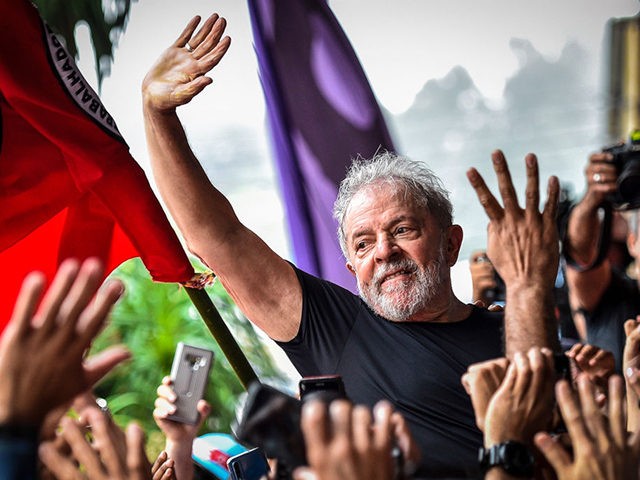A justice on Brazil’s Supreme Federal Tribunal (STF), the nation’s top court, overturned the multiple convictions on charges of corruption against former socialist President Luiz Inácio Lula da Silva on Monday.
Multiple courts have found Lula guilty of receiving a bribe while president in the form of a million-dollar luxury beachfront property and renovations to it since 2017; while the courts repeatedly modified each other’s sentences, the shortest sentence he received was for eight years in prison. The convictions triggered Brazil’s “Clean Slate” law, which bans politicians from running for public office with a conviction on charges of corruption on their record.
As of Monday, the “Clean Slate” law no longer applies, allowing Lula to potentially run for president against incumbent conservative President Jair Bolsonaro in 2022.
The STF’s exoneration of Lula follows the court taking on an increasingly prominent role in arresting conservative and right-leaning critics of the Brazilian left. In May 2020, the STF ordered raids against the homes of 29 YouTube celebrities, comedians, and journalists who had spoken favorably of Bolsonaro in public on alleged charges of “fake news.” Last month, the STF ordered the arrest of a Congressman, Daniel Silveira, over the publication of a YouTube video in which he criticized the STF.
Under Lula, the country experienced one of the most expansive corruption scandals on record, now known by the nickname of the investigation into it, “Operation Car Wash.” Dozens of politicians of multiple parties, not just Lula’s Workers’ Party (PT), have been arrested on charges of accepting kickbacks from private contractors, most notoriously the Brazilian firm Odebrecht, in exchange for lucrative government infrastructure contracts.
STF Justice Edson Fachin — appointed to the court by Lula’s successor and protege, the impeached former president Dilma Rousseff — ruled Monday that the court that initially found Lula guilty did not have the authority to try the case. Fachin did not comment on the evidence that had resulted in a guilty verdict but rather remanded the case to what he considered the appropriate court in the capital, Brasilia. The Brasilia court may find Lula guilty again, resulting in another ban on running for office.
“Operation Car Wash” began as a much smaller investigation in Curitiba, a southern city and regional capital of Paraná state. Investigators, with the support of local judge Sergio Moro, began finding mounting evidence that the apparently local money laundering cases they were probing were tied to a much large conspiracy ensnaring much of the Brazilian Congress and, ultimately, Lula.
The investigation resulted in at least 160 arrests — many of them of prominently lawmakers and other political figures — and police recovered as much as $1 billion as of 2019. Moro became a national hero and was promoted to Minister of Justice under Bolsonaro. He ultimately resigned claiming Bolsonaro did not sufficiently empower him to fight corruption. Bolsonaro denied the allegations.
The Brazilian left has expressed concern with the fact that Fachin’s ruling did not address the investigation Moro led at all, nor did it weigh in on Lula’s innocence. Instead, it simply asserted that Moro did not have jurisdiction to rule on the case because his court was located in Curitiba. Lula’s attorneys had requested the court overrule his conviction on the grounds that Moro was allegedly compromised in his judgment by political opposition to Lula, a claim Moro has denied.
As Lula now has no convictions to his name, the socialist former leader has catapulted to the top of the list of contenders against Bolsonaro in 2022. Prior to his convictions before the 2018 election, some polls found that Lula had more support as a candidate than Bolsonaro. The polling offered conflicting conclusions, however. One poll published in February 2018 by the firm Datafolha, following Lula’s conviction, found that between 34 and 37 percent of respondents would vote for Lula, far more than the 16-18 percent supporting Bolsonaro. Over half of Brazilians said, however, that they wanted the government to Lula from running for president and 53 percent said they wanted to see him in prison.
Lula expressed his intent to run for president again years before the 2018 election, comparing himself to Jesus Christ. He attempted to run against Bolsonaro from prison in 2018, campaigning on the unpopular claim that “Operation Car Wash” was a far-right conspiracy. He refused to give up his nomination as the PT candidate — despite being legally barred from the ballot — until the month before the election, dooming the replacement candidate Fernando Haddad.
Lula is currently 75 years old, raising questions regarding his ability to engage in a rigorous presidential campaign next year. Despite this, O Globo cited a poll on Tuesday show that half of Brazilians would still vote for Lula. Almost the same number, 44 percent, said they would absolutely not vote for him for any reason, making him an extremely polarizing figure. The poll, by the first Ipec, found Bolsonaro fairing poorly against Lula, but significantly better against other potential rivals like Sao Paulo Governor Joao Doria.
Bolsonaro reacted to the news on Monday by highlighting the STF’s left-wing bias.
“Anything decision from the 11 justices, you can guess what they think or what they write on paper. Justice Fachin has strong ties to the PT, this decision doesn’t surprise us in that sense,” the president said. Bolsonaro then described Lula’s first tenure, noting the collapse of the economy and widespread government corruption, as “catastrophic.”

COMMENTS
Please let us know if you're having issues with commenting.